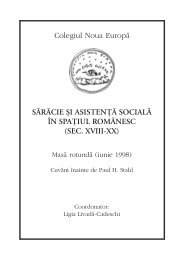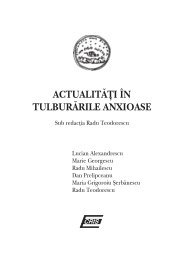- Page 1:
New Europe College Regional Program
- Page 4 and 5:
Editor: Irina Vainovski-Mihai Copyr
- Page 6 and 7:
DENIZ EYLEM YÖRÜK IMPACTS OF INTE
- Page 8 and 9:
Fellowship Programs N.E.C. Yearbook
- Page 10 and 11:
N.E.C. Yearbook 2001-2002 working c
- Page 12 and 13:
N.E.C. Yearbook 2001-2002 Founder o
- Page 15 and 16:
TAMARA CÃRÃUª Born in 1972, in H
- Page 17 and 18:
NATIONAL IDENTITY: INVENTION OR NEC
- Page 19 and 20:
TAMARA CÃRÃUª were not (God) giv
- Page 21 and 22:
TAMARA CÃRÃUª 2. Discourses of n
- Page 23 and 24:
TAMARA CÃRÃUª 2.2 Identity disco
- Page 25 and 26:
TAMARA CÃRÃUª 22 years of the Un
- Page 27 and 28:
TAMARA CÃRÃUª Use of history: Th
- Page 29 and 30:
TAMARA CÃRÃUª When the prospects
- Page 31 and 32:
TAMARA CÃRÃUª of Bolshevik ideas
- Page 33 and 34:
TAMARA CÃRÃUª exorcise nationali
- Page 35 and 36:
TAMARA CÃRÃUª more feasible in a
- Page 37 and 38:
TAMARA CÃRÃUª - Others: de-Russi
- Page 39 and 40:
TAMARA CÃRÃUª There are some ele
- Page 41 and 42:
TAMARA CÃRÃUª support. How can t
- Page 43 and 44:
TAMARA CÃRÃUª firstly, failing t
- Page 45 and 46:
TAMARA CÃRÃUª Oppression is not
- Page 47 and 48:
TAMARA CÃRÃUª - “the ironic fa
- Page 49 and 50:
TAMARA CÃRÃUª Thus, what was see
- Page 51 and 52:
TAMARA CÃRÃUª the language, one
- Page 53 and 54:
TAMARA CÃRÃUª 6.2 Nation-buildin
- Page 55 and 56:
TAMARA CÃRÃUª language is used
- Page 57 and 58:
TAMARA CÃRÃUª autonomy are free
- Page 59 and 60:
NOTES TAMARA CÃRÃUª 1 “Western
- Page 61 and 62:
TAMARA CÃRÃUª kinship. 3. Shared
- Page 63 and 64:
TAMARA CÃRÃUª 38 See, for instan
- Page 65 and 66:
TAMARA CÃRÃUª 61 Eugen Weber in
- Page 67 and 68:
TAMARA CÃRÃUª 85 “Full attachm
- Page 69 and 70:
TAMARA CÃRÃUª Paul Corescu, C. C
- Page 71 and 72:
TAMARA CÃRÃUª Nationalism, Multi
- Page 73 and 74:
TAMARA CÃRÃUª groups, for exampl
- Page 75 and 76:
KRASSIMIRA KRASTANOVA Née en 1955,
- Page 77 and 78:
LE MONDE DOMESTIQUE : LES OBJETS ET
- Page 79 and 80:
KRASSIMIRA KRASTANOVA intérioriser
- Page 81 and 82:
KRASSIMIRA KRASTANOVA domaine de l
- Page 83 and 84:
KRASSIMIRA KRASTANOVA Pierre Nora n
- Page 85 and 86:
KRASSIMIRA KRASTANOVA appréciation
- Page 87 and 88:
KRASSIMIRA KRASTANOVA iii « Mes gr
- Page 89 and 90:
KRASSIMIRA KRASTANOVA Le but du rit
- Page 91 and 92:
KRASSIMIRA KRASTANOVA … cet ensem
- Page 93 and 94:
KRASSIMIRA KRASTANOVA commandions p
- Page 95 and 96:
KRASSIMIRA KRASTANOVA Il y a d’au
- Page 97 and 98:
KRASSIMIRA KRASTANOVA le temps est
- Page 99 and 100:
Photos et albums KRASSIMIRA KRASTAN
- Page 101 and 102:
KRASSIMIRA KRASTANOVA parents, je l
- Page 103 and 104:
KRASSIMIRA KRASTANOVA territoire in
- Page 105:
KRASSIMIRA KRASTANOVA GALLINI, Cl.,
- Page 109 and 110:
RIGHT-WING IDEOLOGY AND THE INTELLE
- Page 111 and 112:
ANETA MIHAYLOVA Bucharest In Novemb
- Page 113 and 114:
ANETA MIHAYLOVA but still not in pa
- Page 115 and 116:
ANETA MIHAYLOVA In terms of the nat
- Page 117 and 118:
ANETA MIHAYLOVA what is discernable
- Page 119 and 120:
ANETA MIHAYLOVA It would have been
- Page 121 and 122:
ANETA MIHAYLOVA In 1940, Crainic re
- Page 123 and 124: ANETA MIHAYLOVA that states are bas
- Page 125 and 126: ANETA MIHAYLOVA Throughout the arti
- Page 127 and 128: ANETA MIHAYLOVA spiritual needs of
- Page 129 and 130: ANETA MIHAYLOVA foreign policy orie
- Page 131 and 132: NOTES ANETA MIHAYLOVA 1 TREPTOW, Ku
- Page 133 and 134: ANETA MIHAYLOVA 18 In the period 19
- Page 135 and 136: ANETA MIHAYLOVA 38 Unlike both Elia
- Page 137: ANETA MIHAYLOVA 69 Ibid, p. 654. 70
- Page 140 and 141: Numerous papers and articles on com
- Page 142 and 143: N.E.C. Yearbook 2001-2002 the rise
- Page 144 and 145: N.E.C. Yearbook 2001-2002 educated
- Page 146 and 147: N.E.C. Yearbook 2001-2002 Everyday
- Page 148 and 149: N.E.C. Yearbook 2001-2002 step by s
- Page 150 and 151: N.E.C. Yearbook 2001-2002 During th
- Page 152 and 153: N.E.C. Yearbook 2001-2002 In fact,
- Page 154 and 155: N.E.C. Yearbook 2001-2002 themselve
- Page 156 and 157: N.E.C. Yearbook 2001-2002 Balkan pe
- Page 158 and 159: N.E.C. Yearbook 2001-2002 the new d
- Page 160 and 161: N.E.C. Yearbook 2001-2002 All my po
- Page 162 and 163: NOTES N.E.C. Yearbook 2001-2002 1 I
- Page 164 and 165: N.E.C. Yearbook 2001-2002 esp. pp.
- Page 166 and 167: N.E.C. Yearbook 2001-2002 43 See GA
- Page 169: SRÐAN ÄLJUKIÇ Born in 1964, in S
- Page 172 and 173: N.E.C. Yearbook 2001-2002 The inten
- Page 176 and 177: N.E.C. Yearbook 2001-2002 independe
- Page 178 and 179: N.E.C. Yearbook 2001-2002 don’t s
- Page 180 and 181: N.E.C. Yearbook 2001-2002 place soo
- Page 182 and 183: N.E.C. Yearbook 2001-2002 The commu
- Page 184 and 185: N.E.C. Yearbook 2001-2002 attempted
- Page 186 and 187: N.E.C. Yearbook 2001-2002 low price
- Page 188 and 189: N.E.C. Yearbook 2001-2002 the socia
- Page 190 and 191: N.E.C. Yearbook 2001-2002 populatio
- Page 192 and 193: N.E.C. Yearbook 2001-2002 The co-op
- Page 194 and 195: N.E.C. Yearbook 2001-2002 members o
- Page 196 and 197: N.E.C. Yearbook 2001-2002 In Bulgar
- Page 198 and 199: N.E.C. Yearbook 2001-2002 proizvods
- Page 200 and 201: N.E.C. Yearbook 2001-2002 movement
- Page 202 and 203: N.E.C. Yearbook 2001-2002 Between m
- Page 204 and 205: NOTES N.E.C. Yearbook 2001-2002 1 T
- Page 206 and 207: N.E.C. Yearbook 2001-2002 the Twent
- Page 209: SVETLANA STAMENOVA Born in 1960, in
- Page 212 and 213: N.E.C. Yearbook 2001-2002 I argue t
- Page 214 and 215: N.E.C. Yearbook 2001-2002 that reli
- Page 216 and 217: N.E.C. Yearbook 2001-2002 the cultu
- Page 218 and 219: N.E.C. Yearbook 2001-2002 aristocra
- Page 220 and 221: N.E.C. Yearbook 2001-2002 ethnicity
- Page 222 and 223: N.E.C. Yearbook 2001-2002 aimed to
- Page 224 and 225:
N.E.C. Yearbook 2001-2002 1) I Will
- Page 226 and 227:
N.E.C. Yearbook 2001-2002 5-1). As
- Page 228 and 229:
N.E.C. Yearbook 2001-2002 correlati
- Page 230 and 231:
N.E.C. Yearbook 2001-2002 Determina
- Page 232 and 233:
N.E.C. Yearbook 2001-2002 represent
- Page 234 and 235:
N.E.C. Yearbook 2001-2002 8) Operat
- Page 236 and 237:
N.E.C. Yearbook 2001-2002 Table 1-2
- Page 238 and 239:
N.E.C. Yearbook 2001-2002 Table 2-1
- Page 240 and 241:
N.E.C. Yearbook 2001-2002 Table 2-3
- Page 242 and 243:
N.E.C. Yearbook 2001-2002 Table 3-2
- Page 244 and 245:
N.E.C. Yearbook 2001-2002 Table 4-1
- Page 246 and 247:
N.E.C. Yearbook 2001-2002 Table 5-1
- Page 248 and 249:
NOTES N.E.C. Yearbook 2001-2002 1 T
- Page 250 and 251:
N.E.C. Yearbook 2001-2002 SCHOPFLIN
- Page 253 and 254:
DEATH AND VITALITY IN MONUMENTAL AR
- Page 255 and 256:
Fields, Limits, Contours NIKOLAI VU
- Page 257 and 258:
NIKOLAI VUKOV monuments, as embodim
- Page 259 and 260:
NIKOLAI VUKOV continuity in life.
- Page 261 and 262:
NIKOLAI VUKOV 1970:11 sq) which mar
- Page 263 and 264:
NIKOLAI VUKOV FIG. 2 - MONUMENT OF
- Page 265 and 266:
NIKOLAI VUKOV of the ideological co
- Page 267 and 268:
NIKOLAI VUKOV about the validity of
- Page 269 and 270:
NIKOLAI VUKOV An important aspect o
- Page 271 and 272:
NIKOLAI VUKOV FIG. 5 - BROTHERLY MO
- Page 273 and 274:
NIKOLAI VUKOV To have a local hero
- Page 275 and 276:
NIKOLAI VUKOV the Iron Curtain. I w
- Page 277 and 278:
NIKOLAI VUKOV FIG. 6 - VICTORY MONU
- Page 279 and 280:
NIKOLAI VUKOV of death into life, o
- Page 281 and 282:
NIKOLAI VUKOV FIG. 7 - THE MAUSOLEU
- Page 283 and 284:
NIKOLAI VUKOV trends of the ideolog
- Page 285 and 286:
NIKOLAI VUKOV of displaying but als
- Page 287 and 288:
NIKOLAI VUKOV the communist Ilie Pi
- Page 289 and 290:
NIKOLAI VUKOV for heroes and ordina
- Page 291 and 292:
NIKOLAI VUKOV Shipka, mausoleum-mon
- Page 293 and 294:
NIKOLAI VUKOV Catalogue Monumentelo
- Page 295 and 296:
NIKOLAI VUKOV KOSELLEK, R., “Les
- Page 297 and 298:
NIKOLAI VUKOV TENENTI, A., La Vie e
- Page 299 and 300:
DENIZ EYLEM YÖRÜK Born in 1975, i
- Page 301 and 302:
IMPACTS OF INTER-ORGANIZATIONAL NET
- Page 303 and 304:
DENIZ EYLEM YÖRÜK engage in this,
- Page 305 and 306:
DENIZ EYLEM YÖRÜK • Upgrading a
- Page 307 and 308:
DENIZ EYLEM YÖRÜK upgrading traje
- Page 309 and 310:
DENIZ EYLEM YÖRÜK acquisition and
- Page 311 and 312:
DENIZ EYLEM YÖRÜK he argues that
- Page 313 and 314:
DENIZ EYLEM YÖRÜK A significant e
- Page 315 and 316:
DENIZ EYLEM YÖRÜK 2.3 Explaining
- Page 317 and 318:
DENIZ EYLEM YÖRÜK Vertical relati
- Page 319 and 320:
DENIZ EYLEM YÖRÜK integrating int
- Page 321 and 322:
DENIZ EYLEM YÖRÜK 3.2 Foreign Dir
- Page 323 and 324:
DENIZ EYLEM YÖRÜK Table 1. Struct
- Page 325 and 326:
DENIZ EYLEM YÖRÜK like rising inc
- Page 327 and 328:
DENIZ EYLEM YÖRÜK 5.1 Concise Com
- Page 329 and 330:
DENIZ EYLEM YÖRÜK subsidiary, and
- Page 331 and 332:
DENIZ EYLEM YÖRÜK local Chamber o
- Page 333 and 334:
DENIZ EYLEM YÖRÜK have shown sign
- Page 335 and 336:
DENIZ EYLEM YÖRÜK one of the firs
- Page 337 and 338:
DENIZ EYLEM YÖRÜK The special cas
- Page 339 and 340:
Table A.1. Basic information about
- Page 341 and 342:
DENIZ EYLEM YÖRÜK Table A.4. Inte
- Page 343 and 344:
NOTES DENIZ EYLEM YÖRÜK 1 Unless
- Page 345 and 346:
REFERENCES DENIZ EYLEM YÖRÜK Arif
- Page 347 and 348:
DENIZ EYLEM YÖRÜK Kornai, J., “







